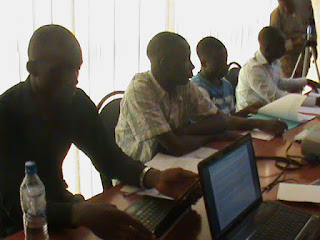Recent decades have witnessed considerable improvement in the way persons with disabilities are viewed in the United States and other Western nations. Concerns for social justice, including recognition of equal rights and provision of equal opportunity, spirited by the success of the Civil Rights movement in the 1950s and 1960s, have increased awareness of the needs and abilities of individuals with physical, sensory, or cognitive disabilities. The result has been the passage of significant legislation related to education and employment, such as The Individuals with Disabilities Education Act and The Americans with Disabilities Act. In the absence of reasonable accommodations required by such laws, the ability of affected individuals to participate fully in society would remain limited.
While efforts to create an inclusive society are ongoing in the West, in Africa, due to cultural beliefs and attitudes persons with disabilities continue to be devalued, dehumanized, and rejected. This is so, despite many of these nations having assented to the Universal Declaration of Human Rights and the Convention on the Rights of the Child adopted by the United Nations General Assembly.
In Nigeria, disabilities accessibility of public and private structures has not been a priority to both policy makers and architects that design the structures. Irrespective of the fact that Nigeria joined 97 other countries in declaring support for disability rights on Friday, 24thSeptember 2008, by signing both the Convention on the Rights of Persons with Disabilities (CRPD) and its optional protocol, she has not enacted a domestic act on disability rights. In the shelves of the Legislature lies a draft bill awaiting presidential assent to pass it in to law. General public awareness campaigns as well as academic studies in the area of disability rights are low with many treating disable people with reckless abandon and disdain.
It is against this back drop that CLEEN Foundation designed this pilot survey in select public structures in Lagos state, to look at how accessible the buildings, their environment and their services are to people living with disabilities as a way to ignite awareness and to cause policy makers to take necessary action. The survey also inquires whether the respondents were aware of the existence of any law(s) and any sensitisation programs by the Lagos state government on the respect of the rights of people living with disabilities. The survey focused on those on wheelchairs, visually impaired as well as on those with hearing and speaking disabilities.
The findings of the survey offer a working tool to policy makers, legislature and the civil society as they portray how much the rights of people living with disability have been neglected both in the structural designs of the building and surrounding environment as well as in the provision of disability friendly services in the public structures under study in Lagos State.
Eban Ebai, PhD
Deputy Director Programs
CLEEN Foundation

CLEEN Foundation is grateful to all public institutions that opened their doors to receive our field researchers who went out to find how accessible their structures and services are to people living with disabilities. These institutions include; Federal High Court Ikeja, Lagos State Secretariat Alausa, General Hospital Ikeja, Lagos State House of Assembly, and Mr Biggs, Tantalizer and Chicken Republic all in Ojodu. To the management and staff of these institutions we say thank you. Special thanks also go to the staff and students of Westlie School for the Hearing Impaired, Bethsedal Home for the Blind, Modupe Cole Memorial School for Children with Disabilities, for responding to the questionnaires.
We immensely thank all those who found time within their tight schedules to participate in the survey. Lastly we thank the able interns of CLEEN Foundation Susan Omonijo and Yetunde Ajifolokun who conducted the pilot project. Many thanks also go to Mr David Anyaele of Center for Citizens with Disabilities for insightful comments and Dr Eban Ebai, Director of Programs at CLEEN for supervising the project.































0 comments:
Post a Comment